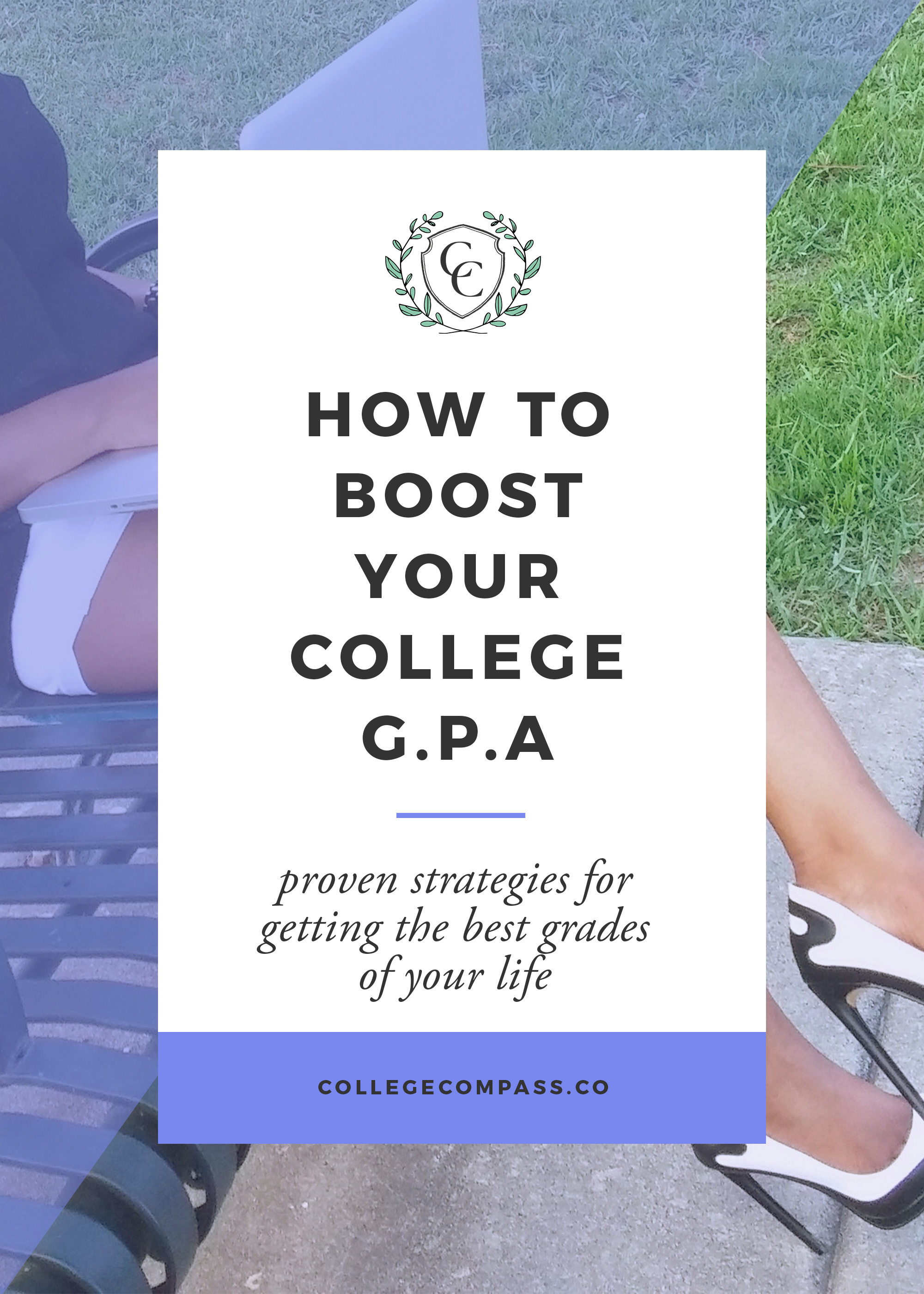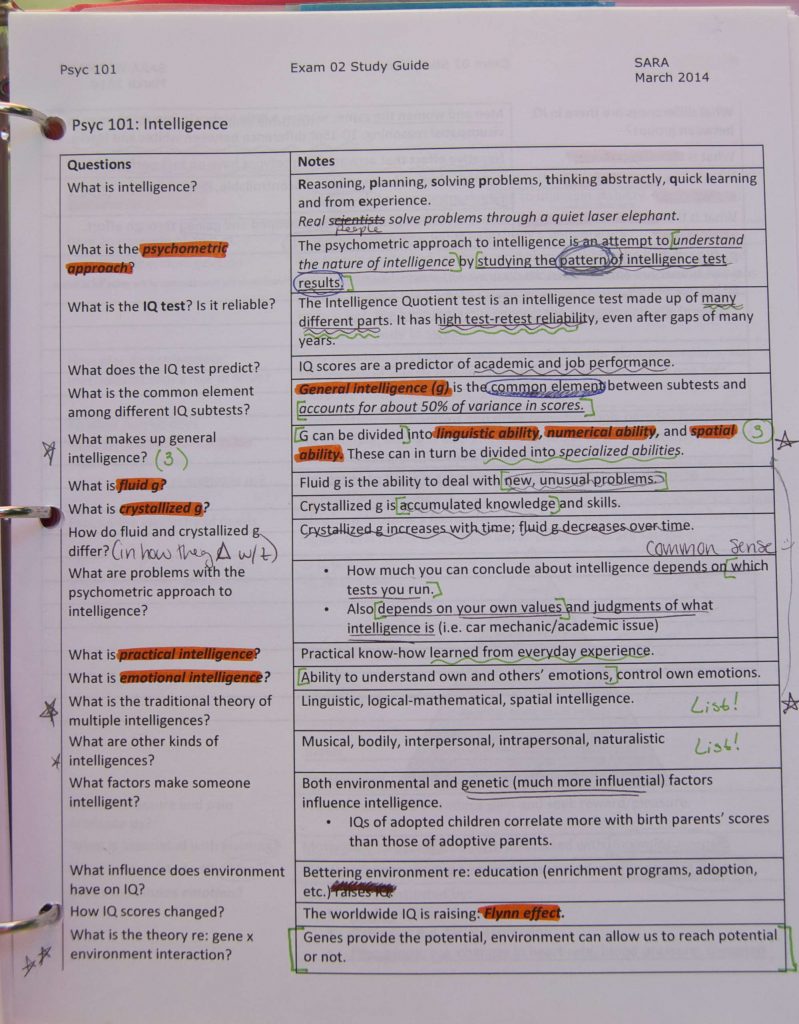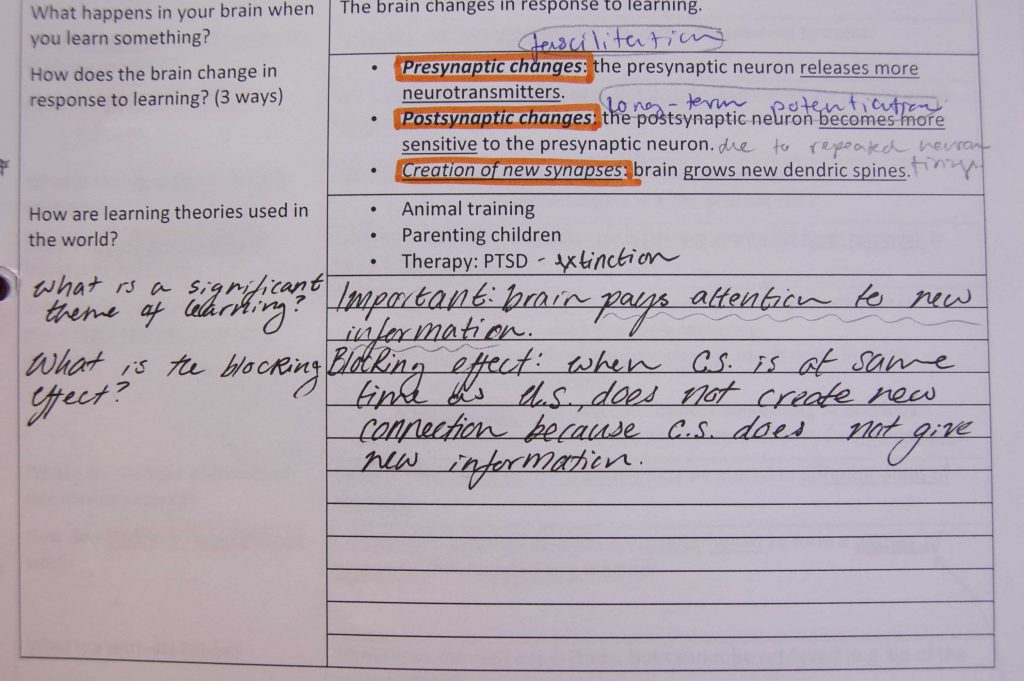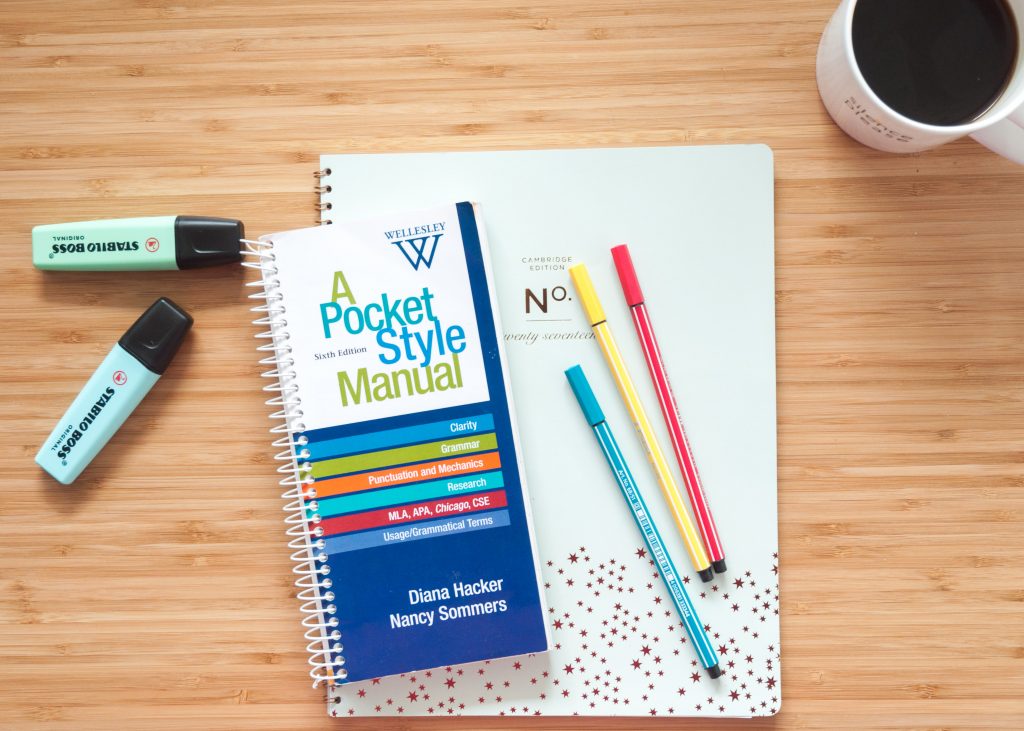I want to help you boost your GPA in college. But before we get to that, I want to tell you a story.
I’m not naturally intelligent. In middle school, I was a C-student. For my 8th grade math final, I got a D-. I didn’t want to work hard unless the assignment was fun, and I didn’t believe in my own ability to succeed. I kept that attitude up to high school until, about halfway through my first year, something changed.
I realized my teachers didn’t think I was smart. I realized they thought some of the material was beyond me. And I didn’t like it.
So I started to work harder. I began putting in extra hours for homework and studying. It was one of the best decisions I ever made. I kept that attitude and effort up until now, eight years later, when I’m studying abroad at Oxford.
I want you to know that no matter where your starting point is, if you want to succeed, you can. I didn’t put this guide together to make myself happy. I did it because I honestly believe that you can do this. If you put in the time and effort, you can and will succeed.
Are you ready? Good. Then let’s get started!

01. College Motivation //
Helpful posts:

If you’re on this page, the odds are that you’re at least a little motivated to start getting better grades. But I want you to hone in on that motivation, because when the going gets tough, some of the reasons you have may not motivate you anymore.
For this step, I want you to take out a piece of paper. (Yes, really. Do it, I’ll wait!) Now think about the following questions.
- Why do I want to improve?
- What can I gain from improving my grades?
- What would be some positive benefits of doing better in school?
Start brainstorming and write down as many answers as you can. They may be different, or they may overlap. Maybe you want better grades because you want to get into grad school, or hold on to your scholarship. Maybe you want to get an internship after graduation. Maybe you just want to make yourself or a parent proud. Whatever your reasons, write down as many as possible. Try to get at least three for each question.
Did you do it? Good. Now take that piece of paper and either hang it up in your work space, or put it away in a drawer where you can access it easily. You want to keep this list so that you can refer back to it easily when you’re feeling unmotivated.
02. Attitude for Success //
Just as important as motivation is attitude. It’s beyond cheesy, I know, but I honestly believe that a positive attitude is one of the most important assets you can develop. And here’s the thing – you can actually develop it! Positivity and optimism are learned traits – I should know, because I haven’t always been as optimistic as I am now. When it comes to getting good grades, here are a few things that I like to keep in mind:
- Almost anything you want to understand, you can learn through time and effort.
- Most of the people you admire started exactly where you are now, and got to where they are through hard work and effort.
- It is totally okay to fail at something. Failure is a sign that you are trying.
Approach your grades and schoolwork with the understanding that you will make mistakes. Understand that those mistakes are the first step to getting better!

03. Setting Goals in College //
Did you notice that I didn’t call this post “How to be a straight-A student?” That’s because these tips aren’t meant to get you straight A’s. They’re meant to get you to your personal best, and help you grow from there.
Make sure that when you’re working, you’re setting healthy, balanced goals for yourself. Try not to compete with others, or even internally with yourself. Remember your motivational goals – this is about helping you, not putting anyone else down.
04. Time Management in College //

The first step to doing better in school is good time management. For this, I use a planner, which you can get for anything from $1 at the Dollar Store to up to $70 from a designer. There is also a free planner that I recently found that I absolutely, absolutely love, called the Passion Planner. It opens with a motivational activity to help you understand what your goals and passions are, and is set up to help you pursue those goals. You can pay for a hard copy, or (because the designer is so kind) share the link on social media and download a whole copy for free.
Once you have a planner, set aside a few minutes to schedule your time.
Start with sleep. Always make sure that you are getting at least eight hours of sleep a night. I guarantee you, you will learn better, work better, and be happier and healthier if you sleep enough.
This leaves you with 16 hours left to go to class, do your work, and take care of yourself. For some people, the 8-8-8 system is really effective: eight hours of sleep, eight hours of work, and eight hours of extracurriculars, self-care, and free time. This doesn’t work for everyone (it doesn’t work for me!), so experiment with your schedule and find what works for you.
You may want to start by recording how you’re already spending your time for three days, and then taking a look at how you want to tweak that. Are you burning out after just a few hours of studying because you’re not taking enough breaks? Are you spending too much time on social media during the day, forcing you to cut into your sleep time to finish your work? Assess your habits and adjust them so you can be both productive and healthy.
The important thing is that you balance your schedule and spend your time intentionally. Make time to rest, make time to have fun, and then also make time to focus on your work and study. Know where your time is going and how you’re spending it.
05. College Organization //
Helpful posts:

Lucky you, I’ve written an entire post on how to get organized in college right here! It details how to set up a planner, how to mark a syllabus, and other tips for keeping track of your assignments and to-dos. Here, though, are my top five tips for getting organized.
- Get a planner. I’ve said it before, and I’ll say it again. Having a planner is so beneficial for keeping track of assignments, engagements, and your time.
- Plan out your week, every week. If you have an assignment due on Friday, mark out what you need to do each day in order to to finish it on time. Doing this will make it easier to keep track of what you need to do every day for your to-do lists.
- Keep a to-do list! Make a list every day of everything you want to accomplish in that day. It will help you stay on-task during your working time.
- Have a folder or binder for each of your classes. Use it to hold your notes, worksheets, and assignments. Include some paper for taking notes in class, and bring your binder with you every time you go to class.
- Keep your desk neat. Having to top of your desk be relatively clear makes it much easier to use it as an actual workspace.
For more tips on getting organized, check out my college organization post.

06. Class time //

This one might seem obvious, but you should go to class! Your education is either free, or it’s something someone is paying for – in either case, you should do your best to take full advantage of that.
In class, take notes. I find that typing notes on a laptop works best for me, as I am a fast typer, but if you notice yourself getting distracted, you can do a few things:
- Download SelfControl or a similar app, which will block any sites you tell it to for any amount of time you set. Set it for your class time so that you can just focus on the lecture while you’re there.
- Go over to handwriting notes. The nice thing about handwritten notes is that it’s easier to draw flow charts and diagrams, so if your class includes those, this may be best for you!
Ask questions. Participate in discussions. Engage with your teacher. Remember that the amount of time you spend in class is limited, so do your best to be “on” during that time – and then give yourself the space and time to bounce back afterwards. I like to remind myself that the better I focus in class, the less time I’ll have to spend reviewing later. More time in class means less time on homework, essays, and other assignments!
07. Reading //
Helpful posts:

For most of your classes, you will likely have reading assignments. I really struggle with these, because my mind tends to wander when I’m not engaged. That’s why I’ve compiled some of my top tips for reading, skimming, and reading comprehension.
- Skimming: Sometimes it’s just not possible to read however much you’re assigned in the time that you’ve been given. Here’s a trick for skimming that I learned from a friend of mine: read the introduction and conclusion of each chapter, and the first and last sentence of every paragraph in between. If the writer is good, these are the parts of the work that they will be using to make their main points.
- Peer reviews: If you need to understand the contents of a book as soon as possible, go to JSTOR and download several academic reviews of the book. They will often give an overview of the contents, arguments, and strong and weak points. This can be a real lifesaver if you have so many books to read in a week that it’s hard to keep them apart.
- Reading summaries: If you are reading a really dense work, I recommend stopping after every few paragraphs and writing down a short summary of what you just read. This can be very helpful for studying later on, as well!
- Underlining and keywords: I don’t recommend writing in library books, but if you own the book or can make a photocopy of the sections you need to read, writing in your book can be extremely helpful. I like to underline key sentences and put stars and keywords in the margins to make the work easier to reference again later when I’m writing or studying!

08. Studying //
Helpful posts:
- The Ultimate Guide to Final Exams
- How to Make a Finals Study Plan
- 10 Ways to Stay Calm and Reduce Stress During Final Exams
As a humanities student, I tend to have more papers and fewer tests than most STEM and social science students. However, I’ve still had my fair share of exams, and these are the tips I’ve found to be the most helpful.
Start early. Begin reviewing your material early in the semester so you don’t need to cram before the exam!
Turn your notes into study sheets. I don’t find the Cornell Notes method to be helpful for taking notes in class, but I find it invaluable for study purposes. Cornell Notes have three sections: a bar on the left for questions, a bar on the right for notes, and a box on the bottom for a summary.
Fill your notes into the right-hand section, and then add corresponding questions to the left side. For example, if your bulleted note says “The Magna Carta was signed in 1215,” on the left side, write, “When was the Magna Carta signed?” When you’re studying, you can cover up the right side and ask yourself the questions to study. Then I use the bottom section to ask extra questions or write a quick summary of the material.
Last, I go through the sheets with a highlighter and pen to mark up the notes and quiz myself.
Find your best study environment. I find it easiest to focus when I’m in a quiet, distraction-less area, but that may not be best for you. Maybe you focus better when listening to music, working with friends, or sitting outside. Try different kinds of study environments and figure out the best one for you.
Flashcards. I also find flashcards to be incredibly helpful for studying and reviewing material. My favorite way to use flashcards is to make them online at a website like Cram.com so that I don’t waste paper. Then I quiz myself using either their website or their mobile app.
Take breaks and sleep. Sleep consolidates memory, and sleeping and taking breaks in general are really important for maintaining your sanity and perspective while you’re studying.
09. Writing //

Helpful posts:
- The Ultimate Guide to Writing a College Paper
- 5 Steps to a Kick-Ass Research Paper Topic
- 3 Essay Timeline Options to Help You Meet Your Deadline
I’ve written a whole post about how to write a college essay, which you can access here. It covers:
- Picking your prompt
- Making a schedule
- Finding sources
- Reading and note-taking
- Drafting an outline
- Writing the essay
- Editing
So for the section on college writing, please click on the post above!
As an aside: if you’re already pretty comfortable with writing papers but you’d like to get the mechanics of style and citation down, I really recommend the Pocket Style Manual. It’s saved my butt more times than I can count when it came to formatting papers, making sure I was citing correctly, and generally improving my writing.
That brings us to our final section, which I think is the most important:
10. Balance //
Read: Staying Calm and Reducing Stress During Exams

It can be so easy to get caught up in grades and performance, but it’s important to remember the most basic reason you’re doing this: to learn. Just like life isn’t about performance, learning isn’t about grades. Do your best to work hard in your working hours and spend your free hours enjoying your life and being healthy. Spend time outside. Be with friends. Breathe, and remember that school and grades don’t define you. Love and appreciate yourself.
With these tips in place, you’ll be sure to improve your grades (and stay happy and healthy in the process).
What are your best tips for improving your grades? Share them in the comments below!

This post was originally published SaraLaughed.com. It has been modified and improved for use at College Compass with permission of the author.






I don’t know but after reading this it gave me a lot of motivation…. Its just that I failed my chem paper I was so disappointed in myself…. I have no idea how to tell my parents…. But thank you now I may know what direction I have to start working on.. Thank you so much
If you are going to class, taking notes, studying the right way, but still struggling on mid-terms and quizzes, go see the professor. Go prepared with some questions. Ideas: what is important to him that the students learn in this class (large topic)? What is his favorite part of this material? What tips would he give in anticipating essay questions? What he thinks you could to improve? Most professors want the students to succeed. For those who are non-tenured, they need you to succeed if they will ever have a chance of becoming tenured. They are the enemy. Go see them.
Also, most universities have writing centers. Finish your papers at least three days in advance and then take it in. Some will allow you to take the paper in as you write it. Set appointments and get the additional feedback, even if you think you don’t need it.